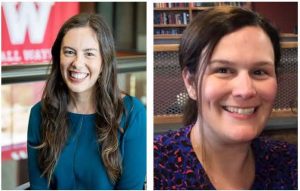We Need Diverse Books (WNDB) utilized the expertise of UW–Madison’s Carolyn Mueller and Lauren Zepp for an article on the organization’s blog that is titled, “How to Make Disability Justice a Classroom Priority.”

Mueller is an assistant professor in the School of Education’s Department of Rehabilitation Psychology and Special Education (RPSE), and Zepp is a RPSE doctoral student.
The article argues for schools to include curricula that explicitly teaches about disabled voices and experiences, and that classroom lessons about identity should make space for the full spectrum of ability without shame or judgement.
Mueller explained: “I think a pervasive attitude about disability is that it’s something we accommodate and ‘work around,’ but not (something we) learn about or consider a respected identity, community, or culture in the world. That attitude harms everyone, but it especially harms youth with disabilities who never see themselves reflected in positive ways in school.”
Zepp observed that “disability is so socially stigmatized we don’t even talk to kids on IEPs about their disability.”
Speaking from her experience working as a special education teacher, Zepp added: “Students were coming to my classroom, not connecting with the identity of disability at all — even actively rejecting it if anyone brought it up to them because it was seen as so shameful and something that, even if you acknowledged it personally, you would never say it out loud to another person and certainly not to your peers.”
Zepp also spoke about the importance of teaching about disability rights and movements throughout history. “I was supporting my students on a history assignment about the Civil Rights movement… When one of my (disabled) students asked, ‘What about people like us? Does anybody try to get us rights?’”
Zepp said teaching about the Disability Rights movement “was something that gave my students a broader perspective on the world. And it was how I, myself, learned about disability rights and the history of disability in America. Before, even as a special education teacher, I didn’t have a concept of things beyond ‘this is IDEA (the Individuals with Disabilities Act) and this is what the law means for schools.’ And so (teaching and exploring Disability Rights) was a pivotal moment for me as a teacher and a person.”
The article explains that, as with marginalized identity, disabled students need access to communities that share and understand their experiences.
“What I’ve heard over and over again from adults with disabilities is that from teachers and schools, they needed connection to the disability community, participation in disability culture, role models, and to see themselves reflected in curriculum,” said Mueller. “That requires a different positioning from teachers: one of allyship and of intentionally listening to disabled community as fundamental to the work of educating students with disabilities.”
Learn more about this critical issue by reading the full article at diversebooks.org.